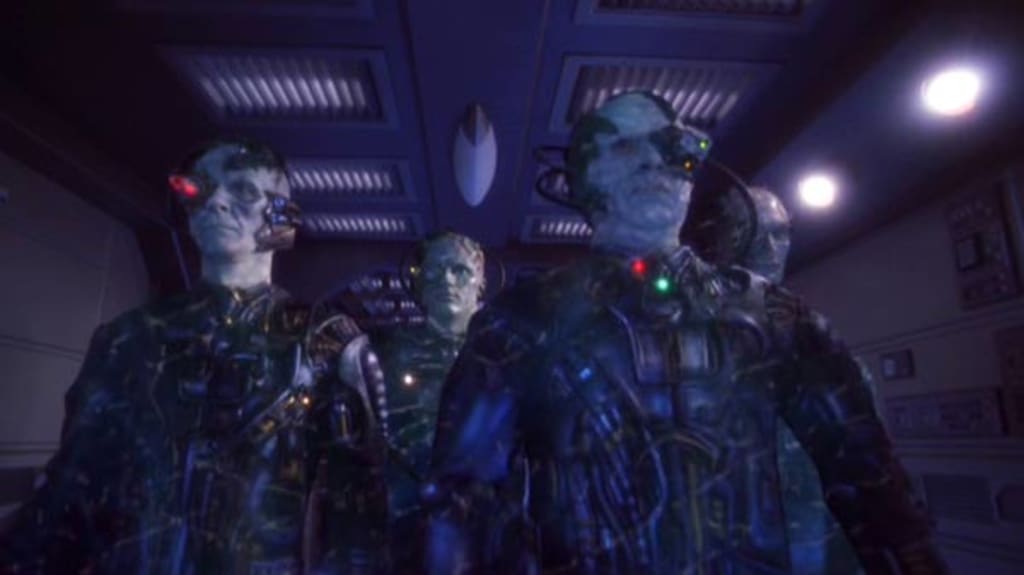The Ethics of the Borg
Is Assimilation Really That Bad?

When one attempts to think of the most menacing villains out of any sci-fi stories, the Borg will come to mind fairly soon. First appearing in the Star Trek: The Next Generation (TNG) episode “Q Who?”, they are an alien race that appears as recurring antagonists in the Star Trek franchise. The Borg are a collection of species that have been turned into cybernetic organisms functioning as drones in a hive mind called the Collective. The Borg use a process called assimilation to force other species into the Collective by violent injection of microscopic machines called nanoprobes. The Borg's ultimate goal is "achieving perfection". To do this they not only use the knowledge they gain from those they have assimilated, but also the technology they salvage from the races they’ve conquered. The Borg are portrayed as juggernauts against which "resistance is futile" and an unstoppable force that mercilessly assimilates and kills for their own good, almost like a zombie plague. Is it truly that simple though? The Borg believe themselves to be in the right. They see the unassimilated as children who cannot make decisions on their own, so in much the same way we would force a child to go to the doctor, they force assimilation on other races for their own good. With these ethics, when it comes to an encounter with the Borg, you can either join or fight. So with these two sides, which option is preferable? We need to know in case we find something like them, and it seems possible that we might, for as Carl Sagan said, “Because terrestrial civilization has only recently achieved radio astronomical capability, it is highly improbable that there are any other communicative civilizations in the Milky Way Galaxy so backward as we. It therefore makes considerable sense for us to receive rather than to transmit messages. It also follows that the transmitting civilization is likely to have technological and scientific capabilities immensely in excess of our own.” In that case, should we join this collective? Should we join the Borg?
The origin of the Borg is never made clear, though they are portrayed as having existed for hundreds of thousands of years (as attested by Guinan, an El-Aurian refugee working on the Enterprise-D, and the Borg Queen). In Star Trek: First Contact, the Borg Queen merely states that the Borg were once much like humanity, "flawed and weak", but gradually developed into a partially synthetic species in an ongoing attempt to evolve and perfect themselves. Before the movie Star Trek: First Contact, the Borg exhibit no hierarchical command structure, instead using a structure similar in principle to the internet with no control center and distributed processing. First Contact introduced the Borg Queen, who is not named as such in the film but is referred to by that name in the credits. The Queen appears in this film; in the finale of Star Trek: Voyager, "Endgame"; and in Voyager's two-part episodes "Dark Frontier" and "Unimatrix Zero". It is never confirmed whether or not all of these appearances represent exactly the same Queen. The Borg Queen is the focal point within the Borg collective consciousness and a unique drone within the collective, who originates from Species 125, and brings "order to chaos", referring to herself as "we" and "I" interchangeably. In First Contact the Queen's dialogue suggests she is an expression of the Borg Collective's overall intelligence; not a controller but the avatar of the entire Collective as an individual. This sentiment is contradicted by Star Trek: Voyager, where she is seen explicitly directing, commanding, and in one instance even overriding the Collective. The collective consciousness is experienced by the Borg as "thousands" of voices — they are collectively aware, but not aware of themselves as separate individuals. Consequently, they never speak in singular pronouns, referring to themselves when required as merely "Third of Five," for instance. While in general the Borg try to assimilate most species, they are in fact highly discriminating with respect to which species they would assimilate. Those deemed unfit for enhancing by the Borg Collective are either ignored or, if they pose a threat, destroyed. In Star Trek: Voyager, Seven of Nine told Neelix that the Kazon were "unworthy" of assimilation and would only detract from the Borg's quest for perceived perfection. Locutus of Borg may have told Worf in TNG: "The Best of Both Worlds, Part II" that the Borg sought to improve the quality of life for all species, however, Seven of Nine in Star Trek: Voyager: "Mortal Coil", provided a seemingly different explanation when she described the Borg's lack of desire to assimilate the (apparently unworthy) Kazon species. Her statements indicated the Borg were interested only in assimilating species they believed would improve their own technological and biological distinctiveness in their quest for perfection. A possible reconciling interpretation is that the Borg believed they would effect ultimate gain for species deemed otherwise unworthy of assimilation via the homogenizing, perfecting expansion (and the attendant extinction of lesser species) of the Collective. Another possible explanation, stated above, is that the Borg changed their philosophy and/or assimilation techniques in the interim between the two episodes. Finally, it is possible the two statements were made under differing motives and that Locutus was trying to mollify the Enterprise-D crew by lying. This all paints a much different picture of the Borg than simply average robots fulfilling programming. In fact, the Borg see perfect technology as spiritual objects, like their own holy grail. All of these details mean that in joining the collective you would still have a personality in a way, but it’s perhaps a personality that does not think as equally as you would expect from a collective conscience. It’s not a being prone to advancing the universe into the next stage of complexity, but instead an entity that is singularly minded about reaching its objective, no matter what it has to do in the process.
Despite their tendency for elitism, the Borg are best described as an amoralist and transhumanist society. According to Arturis, whose people had been mostly assimilated (in essence, wiped out), the Borg were no more guilty than a "force of nature," similar to a hurricane. When discussing their alliance with the Borg in their war with Species 8472, Chakotay made a similar reference to the amoral nature of the Borg by reciting the story of the scorpion and the fox. He likened the Borg's inability to embrace traditional morals, such as trust, as a mere morally-neutral artifact of their nature. This fits the bill for Dr. Seth Baum (Department of Geography, Pennsylvania State University), Dr. Jacob D. Haqq-Misra (Department of Meteorology, Pennsylvania State University), and Shawn D. Domagal-Goldman (NASA Planetary Science Division)’s selfish extraterrestrials as put forth in their paper “Would Contact with Extraterrestrials Benefit or Harm Humanity? A Scenario Analysis”: “A selfish ETI is one that places intrinsic value only on properties of itself: its lives, its welfare, etc.” The reason that they fit under this category instead of universalist extraterrestrials is that their goal is their own perfection, not the broader perfection of all things. Their transhumanism also prevents them from making truly ethical decisions. Transhumanists on Earth engage in interdisciplinary approaches to understand and evaluate possibilities for overcoming biological limitations by drawing on futurology and various fields of ethics. Unlike many philosophers, social critics, and activists who place a moral value on the preservation of natural systems, transhumanists see the very concept of the specifically natural as problematically nebulous at best and an obstacle to progress at worst. The Borg see things in exactly this way despite their lack of what we would consider philosophers. Additionally, the concept of death is an irrelevant idea in the philosophy of the Borg. (TNG: "The Best of Both Worlds") Instead of elaborate rituals or burials, when a drone is damaged beyond repair, it is simply discarded. All of its experiences and memories continue to live on inside the collective consciousness. This is considered a form of immortality by the Borg. These are not issues we can ignore when we decide whether to join the Borg or not. Their lack of interest for anything but their goal makes their collective ethically unsound.
The Borg simply don’t have the level of morality that makes joining their collective the morally sound option. Collective minds like the Borg can be a good idea. They allow more thought than any other form of being and can create an equality amongst everyone involved in the collective. The Borg Collective, however, is simply set up in the wrong way to facilitate these perks. So I say that we should fight the Borg to prevent this from ruining our ability to make our own collective, one that is morally sound. Of course in the process of fighting, we may have to come up against some difficult realities of opposing the Borg. Cambridge University scientist Simon Conway Morris says that the aliens we find might look surprisingly like us. If we find and fight the Borg we may instead find our own people to be the aliens.
About the Creator
History Roundtable
Owner of a history degree and occasional writer of things






Comments
There are no comments for this story
Be the first to respond and start the conversation.